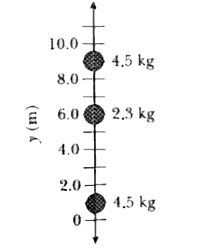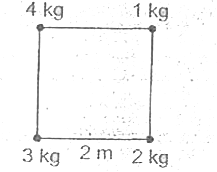A system consists of two particles. At t=0, one particle is at the origin, the other, which has a mass of 0.60kg, is on the y-axis at y=80m. At t=0, the centre of mass of the system is on the y−aξs at y=24m and has a velocity given by (6.0m/s3)t2ˆj.
(a) Find the total mass of the system.
(b) Find the acceleration of the centre of mass at any time t.
(c) Find the next external force acting on the system at t=3.0s.
The correct Answer is:A, B, C
(a) yCM=m1y1+m2y2m1+m2
∴24=(0.6)(80)+(m2)(0)Total mass
∴Total mass=2kg
(b) aCM=ddt(vCM)=ddt[6t2]ˆj
=(12t)ˆjm/s2
(c) Fext=mCMaCM=mCMddt(vCM)
=mCM(12t)ˆj
At t=3s, Fext=(2kg)(12)(3)ˆjN
=(72ˆj)N
Topper's Solved these Questions
- CENTRE OF MASS, LINEAR MOMENTUM AND COLLISIONBook:DC PANDEYChapter:CENTRE OF MASS, LINEAR MOMENTUM AND COLLISIONExercise:Level 1 Subjective Questions
Explore 1 Video
- CENTRE OF MASS, LINEAR MOMENTUM AND COLLISIONBook:DC PANDEYChapter:CENTRE OF MASS, LINEAR MOMENTUM AND COLLISIONExercise:Level 2 Single Correct
Explore 23 Videos
- CENTRE OF MASS, LINEAR MOMENTUM AND COLLISIONBook:DC PANDEYChapter:CENTRE OF MASS, LINEAR MOMENTUM AND COLLISIONExercise:Level 1 Objective
Explore 42 Videos
- CENTRE OF MASS, IMPULSE AND MOMENTUMBook:DC PANDEYChapter:CENTRE OF MASS, IMPULSE AND MOMENTUMExercise:Comprehension type questions
Explore 15 Videos
- CIRCULAR MOTIONBook:DC PANDEYChapter:CIRCULAR MOTIONExercise:Medical entrances s gallery
Explore 19 Videos
Similar Questions
The centre of mass of a system of particles is at the origin. It follows that
View SolutionAt one instant, the centre of mass of a system of two particles is located on the x-axis at x=3.0m and has a velocity of (6.0m/s)ˆj. One of the particles is at the origin, the other particle has a mass of 0.10kg and is at rest on the x−axis at x=12.0m.
(a) What is the mass of the particle at the origin?
(b) Calculate the total momentum of this system.
(c) What is the velocity of the particle at the origin?
View Solution
Knowledge Check
Consider a system of two identical particles. One of the particle is at rest and other has an acceleration →a. The centre of mass has an acceleration
A2aBa/2CaD2a2Consider a system of two identical particles. One of the particls is at rest and the other has an acceleration.The centre of mass has an acceleration vaca The centre of mass has an acceleration.
AzeroB12→aC→aD2→aA nonzero external force acts on a system of particles. The velocity and the acceleration of the centre of mass are found to be v0anda0 at an instant t. It is possible that :
Av0=0,a0=0Bv0=0,a0≠0Cv0≠0,a0=0Dv0≠0,a0≠0
The figure shows two 4.5-kg balls located on the y axis at 1.0 and 9.0 m, respectively, a third ball with a mass 2.3 kg is located at 6.0 m. What is the location of the center of mass of this system?

View SolutionFour particles of masses m, m, 2m and 2m are placed at the four corners of square of side a. Find the centre of mass of the system.
View SolutionFour point masses are placed at the corners of a square of side 2 m as shown in the figure. Find the centre of mass of the system w.r.t. the centre of square.

View SolutionConsider a system of two identical particles. One of the particle is at rest and other has an acceleration →a. The centre of mass has an acceleration
View SolutionTwo particles of masses 1kg and 2kg are located at x=0 and x=3m. Find the position of their centre of mass.
View Solution

